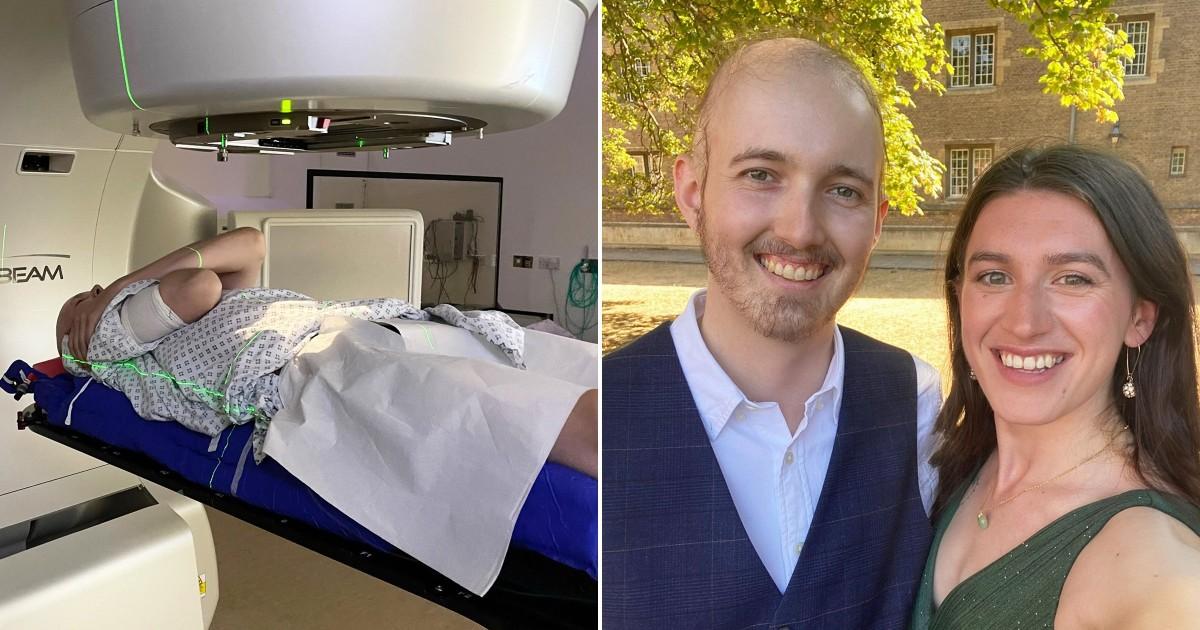
‘When doctors say you have a cancerous tumour the size a melon in your chest, your first instinct is to think: “how is it even possible to survive something like that?”’ recalls 32-year-old Conor McNish-Lane, who was given this shocking diagnosis seven years ago.
‘At the time, because it was localised (meaning it hadn’t spread), doctors were cautiously optimistic about the initial outcome. But unfortunately, as cancers can do, they sometimes come back many years later and spread.’
In 2016, Conor first started getting pain and his rib but didn’t think it was anything to worry about. Then, during a football match with journalist colleagues, he received a blow to his side – resulting in a trip to hospital and an X-Ray.
Results showed Conor, who was 25 at the time, had a cancerous tumour the size of a melon in his chest and he was diagnosed with Ewing’s Sarcoma – a type of cancer that occurs in bones or soft tissue. This rare type of cancer is typically found in children and teenagers, but adults can be diagnosed with it, too.

‘I didn’t know what it was,’ Conor tells Metro, ‘I was a novice with anything cancer-related.’
Following six cycles of intense chemotherapy and six weeks of continuous radiotherapy to shrink the tumour, Conor says it was reduced to the size of ‘fat strawberry’ by the end. Doctors also cut out parts of four ribs, along with the tumour, and inserted a life-lasting mesh into his chest to replace where the ribs had been – before giving Conor the news that he was cancer-free.
‘I got a great outcome as they couldn’t see any disease in the area and the tumour itself had complete necrosis, meaning it was completely dead,’ Conor adds.

However, in May 2022, Conor received the devastating news that the cancer had returned, this time in his pelvis.
But this second time it was an ‘incurable but treatable’ cancer diagnosis, and Conor was given a life expectancy of around a year.
He continues: ‘I think my main feeling was if I’ve got 12 months to live, I want to try and make it the best I can. When you first hear you have cancer, and you don’t know anything about it, it’s devastating and shocking – even though I believed I had a way of making a full recovery.
‘But then you’re told it’s incurable and it will end your life.
‘I think maybe because I’ve had six or seven years of being involved in the cancer community, I just had a wealth of more experience to lean on in handling it the second time.’
Four months after this diagnosis, Conor got engaged to his partner, Helena, in Tuscany – before marrying in April 2022 and enjoying a 10-day honeymoon in Zanzibar.
This year, the newlyweds have spent some time travelling the world together and have ticked off Athens and Iceland so far.


But Conor is also living and working well-past his initial 12-month diagnosis – and has even celebrated two birthdays since then.
Now, the 32-year-old is taking each day as it comes and is currently on a daily oral chemotherapy drug, as well as having regular scans to monitor the cancer.
‘I try not to let the incurable diagnosis rule my life,’ he adds.
‘I still try and get out and do normal things at a young man would want to do – like watching sports, going to football matches and hanging out with friends. But it does limit you to an extent because, obviously, there are times being on treatment where you’re just too tired to go about your daily business.
‘I’m on a daily oral chemotherapy drug to try and, hopefully, stop it from continuing to grow and spread as much as possible. It is a waiting game.
‘As with anyone who is dealing with an incurable cancer diagnosis, what you’re trying to do, ultimately, is buy as much time as possible.’

Following his first diagnosis, Conor was inspired to work on Macmillan’s Cancer Support Line offering men support and helping them to find the confidence to talk about cancer.
‘I do think men struggle to talk about cancer,’ he continues.
‘You could say men in older generations maybe were taught to have a stiff upper lip and not to be too emotional about these things. You know, put your best foot forward and just deal with whatever it is.
‘Whereas for younger generations of men, perhaps social media has something to do with the sort of toxic masculinity that goes around on – where they don’t admit “weakness.” And in the age of Instagram, there are a lot of people who just want to showcase “seemingly perfect” lives, but there are over a quarter of a million men living with a cancer diagnosis who may be experiencing anxiety, depression, or worry about their cancer.’
Conor is also involved in Macmillan’s new Find The Words campaign, which encourages men to open up about their experience of cancer and reach out for support.
The 32-year-old adds: ‘It’s really important that if you if you do suspect, something might be wrong – while obviously everyone hopes it would never be the Big C – it is much better to speak out on any concerns you have and your worries.
‘Sometimes your fears might be brushed aside, but it’s very important that you you do investigate anything that doesn’t doesn’t seem right.’
He adds: ‘I had sort of just always believed that I would be a former cancer patient – that just wasn’t to be.
‘Nowadays, I believe in living life as best as I can with cancer.’
Do you have a story to share?
Get in touch by emailing [email protected].
Source: Read Full Article
